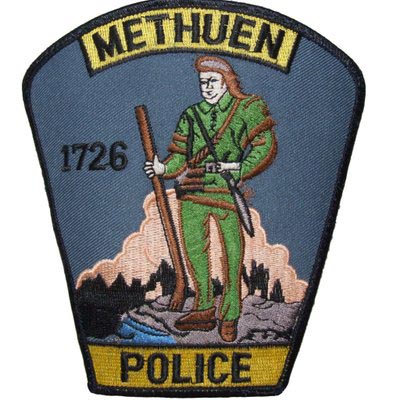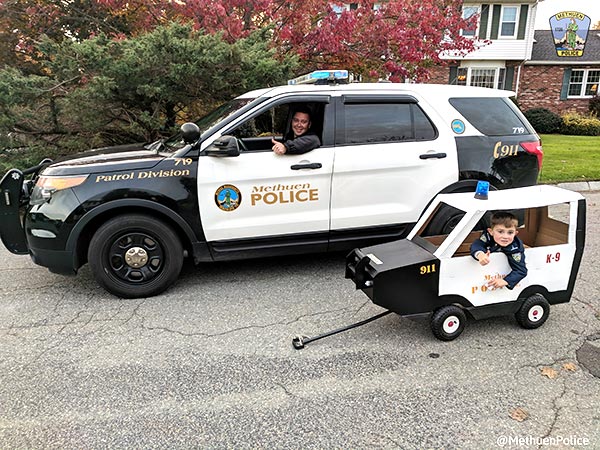Contact Us
To provide feedback on the Community Policing Dispatch, e-mail the editorial board at CPDispatch@usdoj.gov.
To obtain details on COPS Office programs, publications, and resources, contact the COPS Office Response Center at 800-421-6770 or AskCopsRC@usdoj.gov

U.S. Department of Justice
Office of Community Oriented Policing Services
Washington, DC 20530
 The COPS Office is pleased to feature the Methuen (Massachusetts) Police Department (MPD) as one of the October 2019 winners of the Community Policing in Action Photo Contest. The winning photo features MPD Patrol Officer Matthew St. Jean posing with a five-year old boy dressed as an MPD officer and seated in a homemade MPD police car wagon. While conducting neighborhood patrol for the community on Halloween night in 2018, St. Jean and his partner, Officer Derek Licata, happened across the little boy and pulled over to take a photo with him. The little boy was very excited and “a little shocked” to see the officers he was dressed up as, says St. Jean, and the experience was “humbling [for the officers] to see.”
The COPS Office is pleased to feature the Methuen (Massachusetts) Police Department (MPD) as one of the October 2019 winners of the Community Policing in Action Photo Contest. The winning photo features MPD Patrol Officer Matthew St. Jean posing with a five-year old boy dressed as an MPD officer and seated in a homemade MPD police car wagon. While conducting neighborhood patrol for the community on Halloween night in 2018, St. Jean and his partner, Officer Derek Licata, happened across the little boy and pulled over to take a photo with him. The little boy was very excited and “a little shocked” to see the officers he was dressed up as, says St. Jean, and the experience was “humbling [for the officers] to see.”
When asked what he thinks is one of the most vital aspects of community policing, Chief Joseph E. Solomon of the MPD answered that it’s the department’s dedication to supporting its officers’ mental health. Chief Solomon has spent the past 34 years in the field of law enforcement, serving half of his career as a patrol officer and the other half as Chief of the MPD. He has steadily risen in the ranks of the department and knows firsthand the trauma that most officers go through on an almost constant basis. Therefore, while the idea of mental health as a component of overall officer wellness has picked up popularity in recent years, Chief Solomon was an early adopter of the idea of prioritizing mental health. Now, he says, “officer wellness isn’t just about the physical anymore.”
Since 2003, the MPD has worked to solidify its officer mental health program, with the program really picking up speed in the last 10 years. The department has integrated mental health education in its police academy (which welcomes officers from other departments, too). Out of a week-long academy program, three full days are centered around educating officers on mental health and first aid, complete with visits from psychologists, clinicians, and police officers who have experienced the impact of mental health neglect firsthand. The MPD also provides its officers with services to help them recover from trauma, like visits with a clinical psychologist, whenever they need it. “When we see something, we urge [officers] to get help right away,” says Chief Solomon. The department is so focused on keeping the mental health program alive and well that it has allocated a portion of its funding towards the cause, even if it means cutting back on other aspects of the budget. “It is a cost,” Chief Solomon admits, “but it’s way more expensive to not do it.”
Although MPD officers—and many officers across the country—are taking their mental health care into their own hands now, this was not always the case. Historically, “mental health care was seen as a sign of weakness” in law enforcement, Chief Solomon notes. “We never took care of ourselves.” Now, officers are more willing to seek out professional help when they need it, and Chief Solomon says that the MPD is “seeing a change in the officers now, especially in their personalities after counseling.” In fact, in the winning photo, he points out one thing that may be potentially overlooked. “When you look at [Officer St. Jean’s] face, he looks relaxed. It’s not just the fact that he’s smiling for the picture, it’s internal. When you look at pictures of me and [officers] from the 80s, you see frowns on our faces. It’s a change in the thought process; it’s so much better for the officers and their families.”
 Speaking of families, the MPD offers counseling sessions to officers’ relatives because the strain of the occupation follows a lot of officers home. “Unfortunately, our families live a lot of the trauma through us,” says Chief Solomon. The good news is that the department’s counseling services have reported record attendance, which indicates a positive change in the conversation surrounding mental health. “I think the success is measured in how many people actually go, and there’s a lot of people going. The goal is to get more departments to do this.”
Speaking of families, the MPD offers counseling sessions to officers’ relatives because the strain of the occupation follows a lot of officers home. “Unfortunately, our families live a lot of the trauma through us,” says Chief Solomon. The good news is that the department’s counseling services have reported record attendance, which indicates a positive change in the conversation surrounding mental health. “I think the success is measured in how many people actually go, and there’s a lot of people going. The goal is to get more departments to do this.”
According to Chief Solomon, “[Policing has] changed from the police officer being the enforcer to now being more of a guardian. It’s much better because there’s way more positive engagement in the community.” This is apparent every year on Halloween, a night that he describes as “a mini National Night Out,” which sees officers patrolling each neighborhood in town and building relationships with community members along the way. The department has also teamed up with Methuen Mayor Stephen N. Zanni to combat the opioid crisis through its Community Addiction Resource Engagement Services (C.A.R.E.S.) initiative, to “reduce recidivism rates of substance use and crime by raising awareness, providing recovery resources and outreach to the larger community.”
For departments that have experienced success in community policing like the MPD, Chief Solomon emphasizes that there is no limit to implementing the method—or to the good that can come from it. “No matter how much community policing you do, every opportunity to actually engage positively is great.” He also offers advice for law enforcement leaders who want to see their departments experience growth: be flexible in a changing dynamic. In MPD’s case, as the needs of its community changed, so did the name of its Community Policing Division. It was renamed as the Neighborhood Services Bureau before being called its current designation—the Community Engagement Unit. Even though it seems like a simple step, Chief Solomon notes that improving the name over time has displayed the department’s growth to not only the public, but its officers, too.
The MPD has successfully managed to not only continue to achieve its goal of protecting and serving its community, but to become a source of reliability for a community of residents from all walks of life. Thanks to its willingness to embrace innovative practices and welcome a new generation of officers, the MPD has successfully woven community policing into the fabric of the Methuen community. When asked if there is something he wants the public to know, Chief Solomon said that he’s “very proud to have the opportunity to be a Police Chief to wonderful officers whose main goal is to go out and serve their community.”
The COPS Office congratulates the MPD for being one of the 12 winners of the 2019 Community Policing in Action Photo Contest and for its commitment to community policing.
Written with contributions from Chief Joseph E. Solomon of the MPD. Photo courtesy of the MPD.
Shanza Bukhari
Managing Editor
Resources Related to Law Enforcement Mental Health and Wellness:
- Law Enforcement Mental Health and Wellness Programs: Eleven Case Studies
- Officers' Physical and Mental Health and Safety: Emerging Issues and Recommendations
- Building and Sustaining an Officer Wellness Program: Lessons from the San Diego Police Department
- Officer Safety and Wellness Group Meeting Summary: Improving Law Enforcement Resilience - Lessons and Recommendations
Subscribe to Email Updates
To sign up for monthly updates or to access your subscriber preferences, please enter your email address in the Subscribe box.






